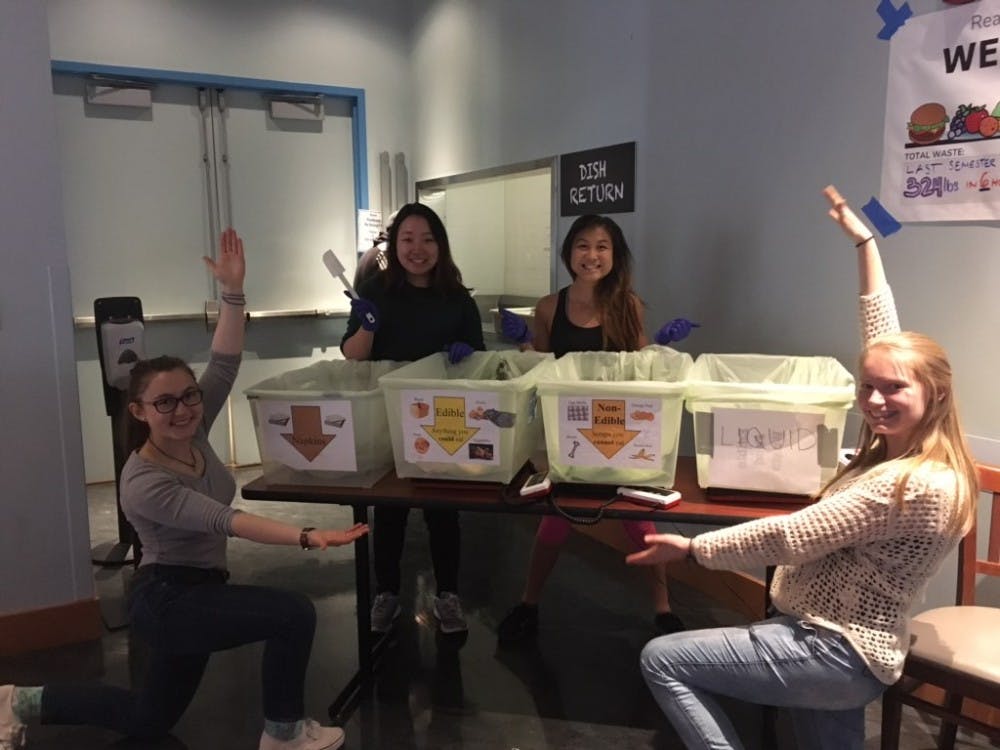Real Food Hopkins (Real Food), a student organization promoting food justice and sustainability, launched the first week of its #WasteOutLoud Challenge on Monday. The challenge encourages students to track their food waste and share the information with Real Food for five consecutive days within the next three weeks.
Sophomores Grace Windheim and Katie Smith, members of Real Food, explained that they wanted to make food waste a more visible issue on campus.
“Unfortunately, people don’t always think about their waste when they don’t have to see it happening,” Smith said.
Windheim elaborated that Real Food hopes that students will keep a record of their food waste over an extended period of time. Students can use a food diary that the organization created and post photos of food that they throw out on Instagram or Facebook.
The #WasteOutLoud Challenge is being promoted in conjunction with Real Food’s Weigh Your Waste Campaign, Smith explained. Weigh Your Waste is held in dining halls on campus each semester. Real Food collects all leftover food, napkins and liquids and sums up the weight in order to show students the magnitude and scale of food disposal.
“It’s really supposed to emphasize the personal impact you have with food waste,” Smith said. “Even when you do Weigh Your Waste and you see you put this much amount of food into the waste bin, that’s one meal, one day of the week. Doing it continuously, you see, ‘Over this amount of time I actually made a lot more waste than I would have realized.’”
According to Windheim, food waste is a common problem in college dining halls because they operate as buffets. When students think about the cost of food, they are less likely to throw it away, she said. However, when eating at a dining hall, students often do not think about the money they may be wasting since they pay a flat fee.
This year, Real Food seeks to increase the number of Weigh Your Waste Campaigns and collaborate with chefs in the dining halls to expand food waste initiatives. This week, they are organizing a campaign in Nolan’s on 33rd. Last fall, the group measured waste in the Fresh Food Cafe (FFC).
“With the three weeks, in two hours each, we had 324 pounds total,” Smith said. “This last week when we were in Nolan’s, we had a total of 23.3 pounds. So it was a lot less.”
Another aim of the #WasteOutLoud Challenge is to educate students about the environmental impact of food waste. According to Smith, many people understand that they should try to minimize waste but do not think about the range of effects that excessive food waste has.
For example, she said that throwing away food also depletes the land, energy and water resources that go into producing and growing food.
“Forty percent of all food is wasted, once it’s prepared as food,” Smith said. “But even before that, 21 percent of water is used to produce food that is ultimately wasted.”
Smith and Windheim encourage students to think of creative solutions to combat food waste. They noted that while composting is better than throwing food into the trash, industrial compost facilities still require energy use.
They hope that the #WasteOutLoud Challenge will provide a forum for students to share ideas on reducing food waste. Windheim said that students can try to be more mindful of using all of their groceries, or of using reusable containers to bring leftovers home.
She added that the social media aspect of the challenge is not intended to make students feel guilty about wasting food.
“It’s not supposed to be shaming,” Windheim said. “People feel accused, and that’s not the point at all. It’s just personal awareness, seeing how others are contributing to the challenge as well.”
Smith added that students should not feel pressured into overeating and that Real Food wants students to be mindful of their health, too.
“We just want to highlight that this is an awareness event. People shouldn’t feel like they have to finish the food on their plate,” Smith said. “It’s not minimize your waste at the detriment of your health.”





